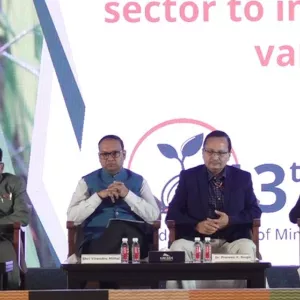Opportunities for the seed sector to contribute to nutrition, sustainability, and livelihoods tackled at NSC 2024
Varanasi, India, 30 November 2024 – Various topics related to emerging challenges and opportunities in the allied areas of the seed sector were deliberated during the 2024 National Seed Congress. One such plenary session, entitled “Emerging opportunities in seed sector to include value-added traits, landraces, and crops,” focused on the potential of value-added traits, traditional landraces, and diverse crops and

Opportunities for the seed sector to contribute to nutrition, sustainability, and livelihoods tackled at NSC 2024
Varanasi, India, 30 November 2024 – Various topics related to emerging challenges and opportunities in the allied areas of the seed sector were deliberated during the 2024 National Seed Congress. One such plenary session, entitled “Emerging opportunities in seed sector to include value-added traits, landraces, and crops,” focused on the potential of value-added traits, traditional landraces, and diverse crops and how they can be harnessed to improve both the nutritional value and marketability of agricultural produce.
The panel brought together a distinguished group of experts, including Dr. Praveen Kumar Singh, Agriculture Commissioner, Government of India; Dr. Dinesh Kumar Agarwal, Registrar General, PPVFRA, New Delhi; Dr. R.C. Chowdhury, Chairman, PRDF, Gorakhpur; Dr. M. Govindaraj, Senior Scientist at Alliance of Bioversity International and CIAT; and Dr. Amit Sharma, Principal Scientist at IIWBR, Karnal. The session was moderated by Dr. Saurabh Badoni, Grain Quality and Nutrition scientist at IRRI. Together, they explored the multifaceted opportunities in the seed sector that can positively impact nutritional health, agricultural sustainability, and farmers’ livelihoods.
Key highlights of the discussion
The session centered on leveraging the seed sector to address nutrition-related challenges, promote sustainable agriculture, and improve farmers’ income through a multitude of innovative approaches, including:
Bio-fortified crops: The panel advocated for the promotion of bio-fortified crops, such as millets, Kalanamak rice, and nutrient-rich cereals and legumes, to combat malnutrition and enhance the nutritional value of the food supply. Traditional varieties: The potential of indigenous landraces, including nutrient-dense rice and millets, was emphasized as a way to offer healthier food options without the need for additional fortification. These crops, deeply rooted in the country’s agricultural heritage, can support more sustainable and nutritious diets. Post-harvest innovations: Participants highlighted the importance of increasing investment in post-harvest technologies to preserve the nutritional integrity…

